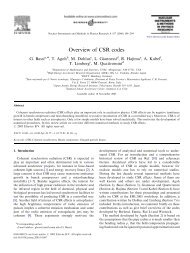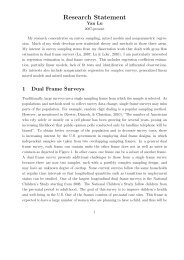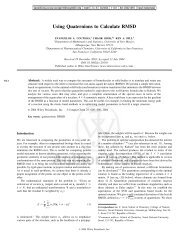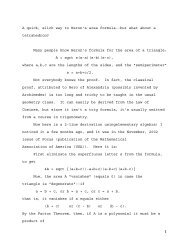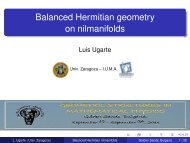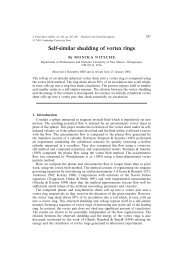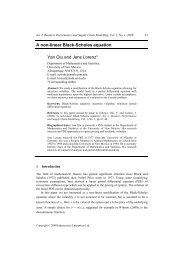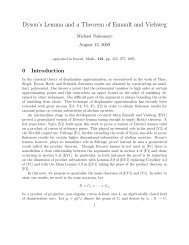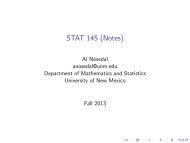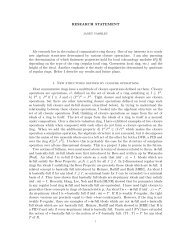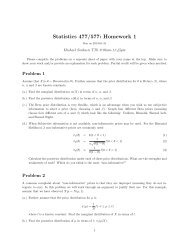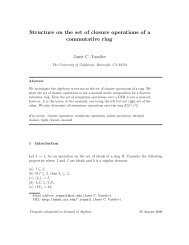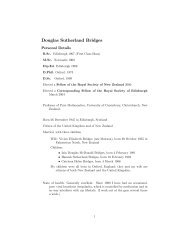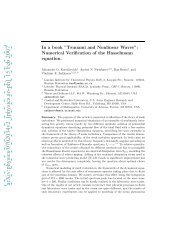OEO Office of Equal Opportunity - Department of Mathematics and ...
OEO Office of Equal Opportunity - Department of Mathematics and ...
OEO Office of Equal Opportunity - Department of Mathematics and ...
Create successful ePaper yourself
Turn your PDF publications into a flip-book with our unique Google optimized e-Paper software.
HISTORY 221<br />
374./574. Southern South America. (3) Hutchison<br />
Argentina, Chile, Uruguay <strong>and</strong> Paraguay from colonization to<br />
the present. Most emphasis on late 19th <strong>and</strong> 20th centuries,<br />
when these nations led the region’s development. Deals with<br />
the rise <strong>of</strong> the export economies, populist movements, militarism<br />
<strong>and</strong> socio-economic stagnation.<br />
375./575. Rebellion <strong>and</strong> Revolution in Modern Andean<br />
Nations. (3) Gauderman<br />
Focuses on the history <strong>of</strong> Bolivia, Colombia, Ecuador <strong>and</strong> Peru<br />
from their independence from Spain to modern times. Explores<br />
political <strong>and</strong> economic themes as well as the socio-economic<br />
<strong>and</strong> political dimensions <strong>of</strong> class, race, ethnicity <strong>and</strong> gender.<br />
376./576. Brazil in the Colonial Period, 1500–1822. (3)<br />
Bieber<br />
Colonial Brazil from 1500 to 1822. Focus on structures <strong>of</strong> colonialism<br />
<strong>and</strong> their impact on indigenous, African <strong>and</strong> European<br />
peoples. Plantation society, slavery, mercantile policy, the role<br />
<strong>of</strong> the church, women <strong>and</strong> family will be discussed.<br />
377./577. Modern Brazil, 1822–Present. (3) Bieber<br />
History <strong>of</strong> Brazil since independence. Topics include oligarchical<br />
politics, the end <strong>of</strong> slavery, race relations, urbanization,<br />
industrialization, authoritarian regimes, labor <strong>and</strong> peasant<br />
movements.<br />
389. Latin American Thought I. (3)<br />
(Also <strong>of</strong>fered as RELG, SOC, PHIL 389.) Pre-Columbian<br />
thought through independence ideologies.<br />
390. Latin American Thought II. (3)<br />
(Also <strong>of</strong>fered as SOC, RELG, PHIL 390.) Positivism through<br />
contemporary thought.<br />
468./648. Society <strong>and</strong> Development in Latin America,<br />
1492–Present. (3) Bieber<br />
Overview <strong>of</strong> social <strong>and</strong> economic trends in Latin America,<br />
stressing labor systems, social structure, trade, demography<br />
<strong>and</strong> industrialization.<br />
469./649. Inter-American Relations. (3) Hall<br />
Relations among the American nations since 1810 <strong>and</strong> with<br />
other world powers. Stresses U.S. role in the region after 1900,<br />
as well as tendencies to curb that influence. Guerrilla warfare,<br />
revolutionary networks <strong>and</strong> Third World ideology covered.<br />
470./650. Labor <strong>and</strong> Working Class in Latin America.<br />
(3) Hutchison<br />
This course traces the evolution <strong>of</strong> Latin American labor<br />
systems in the modern period.<br />
471./651. Women in Early Latin America. (3) Hall,<br />
Gauderman<br />
(Also <strong>of</strong>fered as WMST 418.) A historical exploration <strong>of</strong> the<br />
place <strong>of</strong> women within the social systems <strong>of</strong> pre-Columbian<br />
<strong>and</strong> colonial Latin America. Will explore the gendered dimensions<br />
<strong>of</strong> the economy, politics <strong>and</strong> culture in indigenous <strong>and</strong><br />
Spanish societies.<br />
472./652. Women in Modern Latin America. (3) Hall,<br />
Hutchison<br />
(Also <strong>of</strong>fered as WMST 472.) Course will focus on women<br />
in Latin America, 1821–present, through various historical<br />
developments. Will explore political themes, such as suffrage,<br />
revolution <strong>and</strong> military regimes <strong>and</strong> social dimensions<br />
<strong>of</strong> class, race, ethnicity, work <strong>and</strong> family.<br />
473./653. Indigenous Peoples <strong>of</strong> Latin America. (3)<br />
Bieber, Gauderman<br />
Historical overview <strong>of</strong> indigenous peoples <strong>of</strong> Spanish <strong>and</strong><br />
Portuguese America from pre-colonial times to the present.<br />
Emphasis on cultural history, contact <strong>and</strong> change <strong>and</strong> policies<br />
impacting native American groups.<br />
474./654. Slavery <strong>and</strong> Race Relations. (3) Bieber<br />
Overview <strong>of</strong> slavery, the slave trade <strong>and</strong> post-emancipation<br />
race relations in the U.S., the Caribbean <strong>and</strong> Latin America.<br />
475./655. The Cuban Revolution, 1959 to Present. (3)<br />
(Also <strong>of</strong>fered as SOC 484.) Background to revolution since<br />
1898; emphasis on period since 1959.<br />
476./656. Latin American Religions. (3) Hutchison<br />
Religious experience, movements <strong>and</strong> communities in Latin<br />
America, from conquest to the present. Examines the cultural<br />
interactions that have shaped belief <strong>and</strong> practice, <strong>and</strong> politics—particularly<br />
the influence <strong>of</strong> Catholicism <strong>and</strong> <strong>of</strong> native<br />
<strong>and</strong> African religions.<br />
VIII. Asian History<br />
300./500. Studies in History. (1-3, no limit) ∆<br />
Will vary from instructor to instructor, but will be an in-depth<br />
analysis <strong>of</strong> specific historical problems. For course content,<br />
consult Schedule <strong>of</strong> Classes.<br />
380./580. The Ancient Near East. (3)<br />
A political <strong>and</strong> social survey <strong>of</strong> civilization in Egypt <strong>and</strong><br />
Mesopotamia from its birth in Sumer in the fourth millennium<br />
to the destruction <strong>of</strong> the Achaemenid Persian empire<br />
by Alex<strong>and</strong>er.<br />
381./581. Traditional China. (3) Porter<br />
Emergence <strong>and</strong> development <strong>of</strong> Chinese civilization to its<br />
height in the 13th century, including cultural, political, social<br />
<strong>and</strong> economic themes.<br />
382./582. Imperial China. (3) Porter<br />
The development <strong>of</strong> early modern society <strong>and</strong> the impact <strong>of</strong><br />
the West from the 13th to the 20th century.<br />
383./583. Revolutionary China. (3) Porter<br />
Political, social economic <strong>and</strong> cultural history <strong>of</strong> China in the<br />
revolutionary period from 1911 to the present.<br />
384./584. History <strong>of</strong> Japan. (3) Porter<br />
Social, political, <strong>and</strong> economic institutions from historical<br />
beginnings to modern times.<br />
386./586. The Islamic Middle East to 1800. (3) Risso<br />
The political, social <strong>and</strong> economic development <strong>of</strong> the Islamic<br />
world through the Ottoman <strong>and</strong> Safavid eras. Arab, Persian<br />
<strong>and</strong> Turkish elements <strong>of</strong> Islamic civilization will be included.<br />
387./587. The Modern Middle East from 1800. (3) Risso<br />
Topics include 19th-century reform attempts, the transition<br />
from empire to nation-states, the gap between ideology <strong>and</strong><br />
practice, the Arab-Israeli conflict <strong>and</strong> revolutionary Iran.<br />
388./588. India. (3) Risso<br />
History <strong>of</strong> South Asia with emphasis on cultural development,<br />
social groups <strong>and</strong> religious communities <strong>and</strong> the establishment<br />
<strong>of</strong> the modern nation-state <strong>of</strong> India.<br />
453. Asian Studies Senior Thesis. (3)<br />
(Also <strong>of</strong>fered as RELG, PHIL, POLS 453.) Supervised<br />
research in one or more disciplines leading to an undergraduate<br />
thesis for the major in Asian Studies.<br />
480./660. Christians <strong>and</strong> Spices: The Western Impact on<br />
Asia. (3) Porter<br />
The era <strong>of</strong> European expansion in Asia from Vasco da Gama<br />
to circa 1900; sources <strong>of</strong> European expansion, the early<br />
struggles <strong>and</strong> conquests, colonial systems <strong>and</strong> imperialism.<br />
481./661. Islam. (3) Risso<br />
(Also <strong>of</strong>fered as RELG 481.) Topics include the development<br />
<strong>of</strong> Islamic law <strong>and</strong> theory; philosophy <strong>and</strong> mysticism; ritual<br />
<strong>and</strong> art. The political, social <strong>and</strong> economic ramifications <strong>of</strong><br />
Islam will be emphasized.<br />
482./662. Raj: India During British Rule. (3) Risso<br />
Covering the two centuries from 1756 through 1947, this<br />
course includes inter-cultural contacts, economic issues <strong>and</strong><br />
the developments <strong>of</strong> both Indian <strong>and</strong> Muslim nationalisms.<br />
ARTS AND<br />
SCIENCES<br />
UNM CATALOG 2006–2007 Symbols, page 611.



